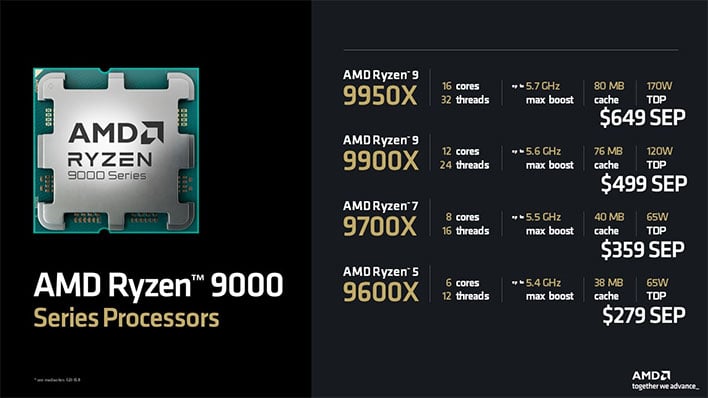At long last, AMD has officially revealed its suggested e-tailer pricing (SEP) for its initial stack of Ryzen 9000 series processors based on
Zen 5, and we'd venture to guess that most of you are going to like the price points. That's because all four desktop SKUs are cheaper than what the previous generation Ryzen 7000 models launched at—up to $50 less expensive at the top end.
Before we get into that, note that we just posted our
dual review of the Ryzen 7 9700X and Ryzen 5 9600X that's chock full of benchmarks and in-depth analysis. If you haven't done so already, give it a read to see how the two mainstream SKUs stack up to the previous generation, as well as some of Intel's 14th Gen offerings. We also compare against the Ryzen 7 7800X3D.
We also go over pricing and the value proposition of those two models in our review. What about the Ryzen 9 9950X and Ryzen 9 9900X, though? AMD spilled the beans in a slide posted to X/Twitter.
Starting at the top, the SEP for the Ryzen 9 9950X is $649. For comparison, the Ryzen 9 7950X launched at $699, so the newer silicon represents a $50 price reduction for what takes the mantle as AMD's flagship consumer processor.
Sitting one rung down is the Ryzen 9 9900X with the SEP set at $499. Again, that's a $50 price reduction compared to the previous generation part it supplants, the Ryzen 9 7900X.
Next up is the Ryzen 7 9700X, which as we already revealed in our review, carries an SEP of $359. That's $40 less than the launch SEP of the Ryzen 7 7700X.
Finally, the Ryzen 5 9600X debuts with a $279 SEP, versus the Ryzen 5 7600X coming out of the gate with a $299 SEP. It's a smaller price reduction at $20, but still cheaper.
Interestingly, the official Ryzen 7 9600X and Ryzen 5 9600X pricing matches what
Best Buy had leaked a week ago when it prematurely went live with listings for all four SKUs. However, Best Buy's listed pricing on the Ryzen 9 9950X and Ryzen 9 9900X are both lower than what AMD has revealed, so it will be interesting to see if street pricing deviates from the SEPs.
The other thing to note is that street pricing on the Ryzen 7000 series is lower than what the chips launched at...
- Ryzen 9 7950X (16C/32T, 4.5GHz-5.7GHz, 64MB L3 cache, 170W): $549.99 (down from $699.99)
- Ryzen 9 7900X (12C/24T, 4.7GHz-5.6GHz, 64MB L3 cache, 170W): $399 (down from $549.99)
- Ryzen 7 7700X (8C/16T, 4.5GHz-5.4GHz, 32MB L3 cache, 105W): $329.99 (down from $399.99)
- Ryzen 5 7600X (6C/12T, 4.7GHz-5.3GHz, 32MB L3 cache, 105W): $229.99 (down from $299.99)
Bear in mind that the Ryzen 9000 and Ryzen 7000 series both use the same AM5 socket. This means that anyone building an AMD system from the ground up have an interesting to choice to make—save a few bucks on what's now a previous generation architecture, or spend a bit more on the newer silicon. There's no right or wrong answer here.
That said, we'd definitely lean towards the Ryzen 7 9700X and Ryzen 5 9600X over the Ryzen 7 7700X and Ryzen 5 7600X, respectively, given that the price differences are relatively small. The tougher choice comes when comparing the top two SKUs, as the price difference jumps to $100. Either way, buildings piecing together an AMD rig have plenty of options to choose from, and that's a good thing.



